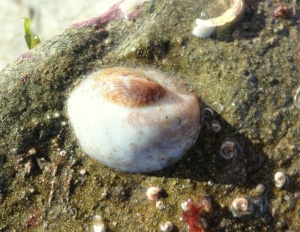It’s always exciting when you find something new, something different, but did you know how easy it is to record your finds? Sending in your sightings can help conserve our fantastic wildlife.

After the recent huge spring tides, I had a long list of species spotted at various beaches, and I was dreading writing everything up.
It was time to try out the new Online Recording for Kernow and Isles of Scilly (ORKS) website.
The Environmental Records Centre for Cornwall and the Isles of Scilly (ERCCIS) at the Cornwall Wildlife Trust now offers three ways to send in your seashore records.
1. ORKS. Sign up for this new system and it will remember your details so all you need to do is type in the species you’ve found, pinpoint the location and you’re done. I was impressed by how quick and easy it was to add and comments.
A useful feature is that it brings up species suggestions as you start typing, a big help if you’re as shaky as I am on Latin spellings.
You can also search the database to see what else has been found recently or in the location you’re visiting. The more people use the system, the better this resource will be.
2. Identification
You don’t have to be an expert to record interesting things and even the experts are baffled by what they find from time to time. If you have something you’d like to identify, you can send your photos or descriptions to the Wildlife Information Service.
3. Seashore sightings
If you’re submitting one-off sightings and you prefer not to sign up to ORKS, you can still submit an online form.
Recording wildlife helps conservationists answer lots of questions such as…
- What’s there?
Records are often patchy even for common species. Your record of a limpet or a shore crab might be the first one for that beach.

- Are there rare or threatened species?
Knowing about these can increase the protection a site gets or change how it’s managed. For instance records of stalked jellyfish, European eels and giant gobies are important evidence for the creation of Marine Conservation Zones.

- Are alien and invasive species present?
These can have an impact – positive or negative – on the ecosystem so it’s important to monitor them.

- Is this likely to be a good habitat for rare species?
For example, if there’s seagrass, there could be seahorses living nearby. Knowing what’s there can lead to further studies in an area.

- Has something changed?
Regular records can start to build up a useful picture so that we can spot changes early. Look out for these species that may be indicators of climate change.

So please do send in your finds to the Cornwall Wildlife Trust – I’d love to hear about them too! If you’d like to find out more about shore surveys and get some practice, why not volunteer with Cornwall Wildlife Trust or your local Marine Conservation Group – see the Links page for more details.


Hi Heather I love following your blogs thanks for sharing them. I wasn’t sure if you knew there was a Newquay Marine Group now who are doing rockpool surveys too. They have a facebook page for details of rockpool and beach cleans etc. warmest wishes Annabelle
LikeLike
Hi Annabelle, Yes, it was great to hear about all the amazing things the Newquay Marine Group have been up to at the Your Shore conference last year and I’m following the group’s work on Facebook. I’ve seen some wonderful photos of scarlet and gold cup corals nr Fistral from a recent survey – fantastic stuff! I grew up near there but only saw my first cup corals in that area during the recent low tides. I hope to make it along to one of the events soon. All the best, Heather
LikeLike